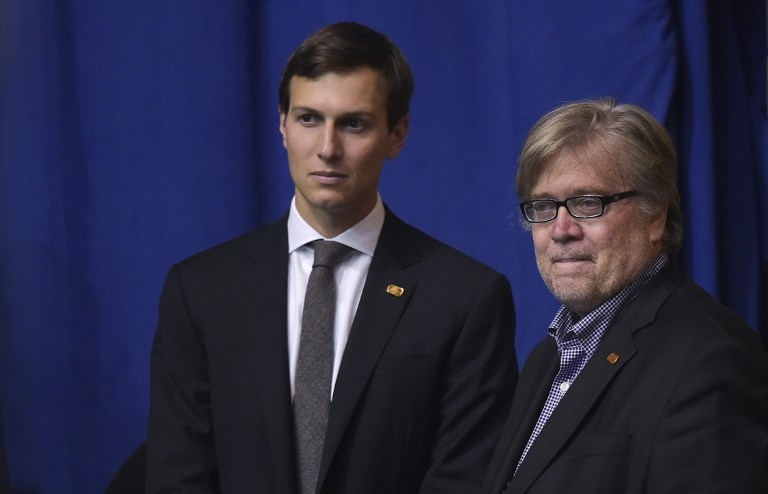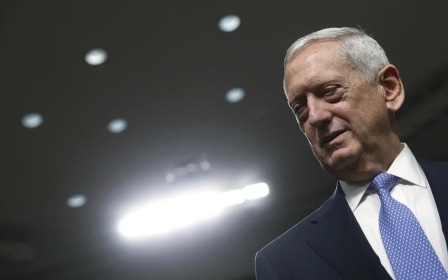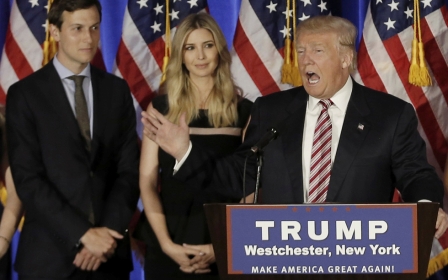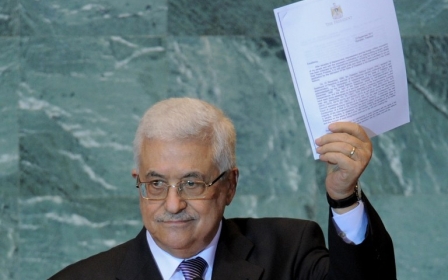The odd couple steering Middle East policy in Trump's inner circle

Jared Kushner and Steve Bannon make, on the face of it, a very unlikely couple. And yet they are now Donald Trump’s two most senior White House advisors.
The 35-year-old Kushner is married to Trump’s daughter, Ivanka. He is Orthodox Jewish and Ivanka converted to Judaism to marry him in 2009. Bannon, until he was recruited to run the Trump campaign in August of last year, was editor-in-chief of Breitbart News, an outlet often accused of being a bastion of anti-Semitism.
It is a mark of the seismic shift in American politics that Bannon, a 63-year-old maverick outsider and Kushner, a cultured scion of New York’s privileged elite, have joined forces to advise and perhaps contain Donald Trump, possibly the most unpredictable and unruly president ever elected.
I have written about Steve Bannon for Middle East Eye and you can find that article here. But what about Jared Kushner?
Family ties
Two facts immediately leap out. In the foyer of the Kushner business headquarters, 666 Fifth Avenue, in Manhattan, is a copy of a book titled The Miracle of Life. It is the extraordinary account of how Jared’s grandparents survived the Holocaust, arrived in America with nothing and built a real estate empire.
The second is about Jared’s father Charles who was convicted and jailed in 2005 for income tax evasion, hiding illegal campaign donations – primarily to the Democrats - and witness tampering. At 24, the young Kushner stepped in to run the business while flying to visit his father in prison most weekends. By all accounts, he did the job well, his quiet demeanour covering an implacable will of steel. The elder Kushner served a year in an Alabama penitentiary before being released to a halfway house, completing his sentence in 2007.
It is the witness tampering that gives the greatest insight into the otherwise closed world of the Kushner family. Charles was already feuding with his brother-in-law and sister over real-estate deals gone sour when the FBI and an ambitious federal US attorney from New Jersey were closing in. The sister had agreed to cooperate with the FBI.
In retaliation, Charles set up a honey trap with a prostitute and a hidden camera and caught his brother-in-law in flagrante. The aim was to shut the sister up in a crude blackmail attempt, but it backfired very badly.
In order to avoid a lengthy trial and the intense media appetite for salacious material that would follow, Charles Kushner folded his tent and pleaded guilty to all charges.
That US attorney, by the way, was none other than Chris Christie, who went on to become governor of New Jersey, was an early and enthusiastic supporter of Trump when he was being shunned by the rest of the Republican establishment, and for a time was touted as a likely running mate.
Revenge and real estate
But Jared, like Donald Trump, has a long memory, and he also shares his father’s streak for seeking vengeance, albeit in a much more refined way. Jared Kushner is widely credited for bringing Steve Bannon in to revive a failing campaign in August of 2016.
At the time, fingers of blame were pointed at Christie who was heading up transition planning in the event of a Trump win. Trump subsequently bypassed Christie as his vice presidential choice on the advice, it is said, of Jared and then, after his election triumph, abruptly dumped the governor from the transition team. Revenge is indeed a dish best served cold.
Jared’s big focus, however, was not to take down Christie; that was simply icing on the cake. The ultimate goal was to achieve the most audacious political upset America has ever seen. And to do that, Jared Kushner gauged correctly that Trump needed Steve Bannon.
So he quite pragmatically set aside the matter of anti-Semitism as an irrelevance, while grasping almost intuitively that the way to a Trump win was to give voice to white, working class, very angry Americans. It was a voice largely unheard and unreflected either in most major media outlets or the Hillary Clinton campaign. Jared, though, saw it for what it was: a glittering piece of under-valued real estate, sitting there just waiting to be snapped up and exploited.
Bannon took it and played it brilliantly, focussing on “lying Hillary” and the establishment media, the so-called “lying press”, that supported her while pouring scorn on Trump.
Alt-right hero, Holocaust survivors
It is worth noting that Jared had taken his time endorsing his father-in-law’s bid. He says that what swung it for him was getting outside the bubble of New York elitism, of going to rallies in the rust belt of America and seeing the impact Trump was having on disaffected, disadvantaged and alienated voters.
They were connecting with the Trump message and the more they connected, the stronger Trump became. He fed off their energy as they fed off his anti-immigrant, anti-Muslim, anti-establishment utterances and he rode their anger all the way to the White House.
So how will Jared Kushner, grandson of Holocaust survivors, get on with Steve Bannon, hero of the anti-Semitic alt right?
By all accounts very well, for the time being at least. When there was a howl of protest from organisations such as the powerful Anti-Defamation League about the Bannon appointment, Kushner rallied support. Andrew Rice in his excellent New York magazine piece quotes Bannon as saying: “You’re in a foxhole with (Jared), and fighting with him, you’re a brother, and he will defend you nonstop."
Now these two brothers-in-arms will be advising Trump on among other things the Middle East, a region where the soon to be president has veered wildly in his pronouncements and tweets.
A Bannon exit?
There are suggestions that Trump will move the US embassy to Jerusalem which, were it to happen, would be highly provocative and completely at odds with his musings about securing a deal that worked both for Israel and the Palestinians. He has hinted that his son-in-law could lead the peace talks. And that rather flies in the face of the fact that the Kushner family foundation has supported Jewish settlements in the West Bank.
Early in his campaign to become the Republican nominee, Trump told an audience in Terre Haute, Indiana, “I am going to try and make that deal just because – man, would that be a beauty – if you like deals. I like deals. I do deals. That would be great.”
And who knows, maybe The Donald can. This is, after all, a time of abounding contradictions, of confounded experts and bemused pollsters who find themselves playing the fool’s role. And into this maelstrom of political upheaval and social and economic uncertainty stride Bannon and Kushner, two knights entering Trump’s court of chaos.
Bannon is an iconoclast, a man who sees the road ahead as a teardown of liberal democracy and all its edifices. Kushner, on the other hand, is a dealmaker like Trump. The deal and the family are all.
It will be interesting to see how long the relationship prospers. When it falters, as it must surely do, it will be Bannon who walks.
Because for Donald Trump family, too, is everything.
- Bill Law is a Middle East analyst and a specialist in Gulf affairs. He tweets @billlaw49.
The views expressed in this article belong to the author and do not necessarily reflect the editorial policy of Middle East Eye.
Photo: In September 2016, Jared Kushner and Steve Bannon watched as Donald Trump spoke at a rally at the Canton Memorial Civic Center in Ohio (AFP)
New MEE newsletter: Jerusalem Dispatch
Sign up to get the latest insights and analysis on Israel-Palestine, alongside Turkey Unpacked and other MEE newsletters
Middle East Eye delivers independent and unrivalled coverage and analysis of the Middle East, North Africa and beyond. To learn more about republishing this content and the associated fees, please fill out this form. More about MEE can be found here.





